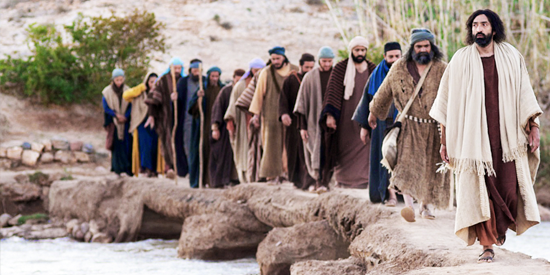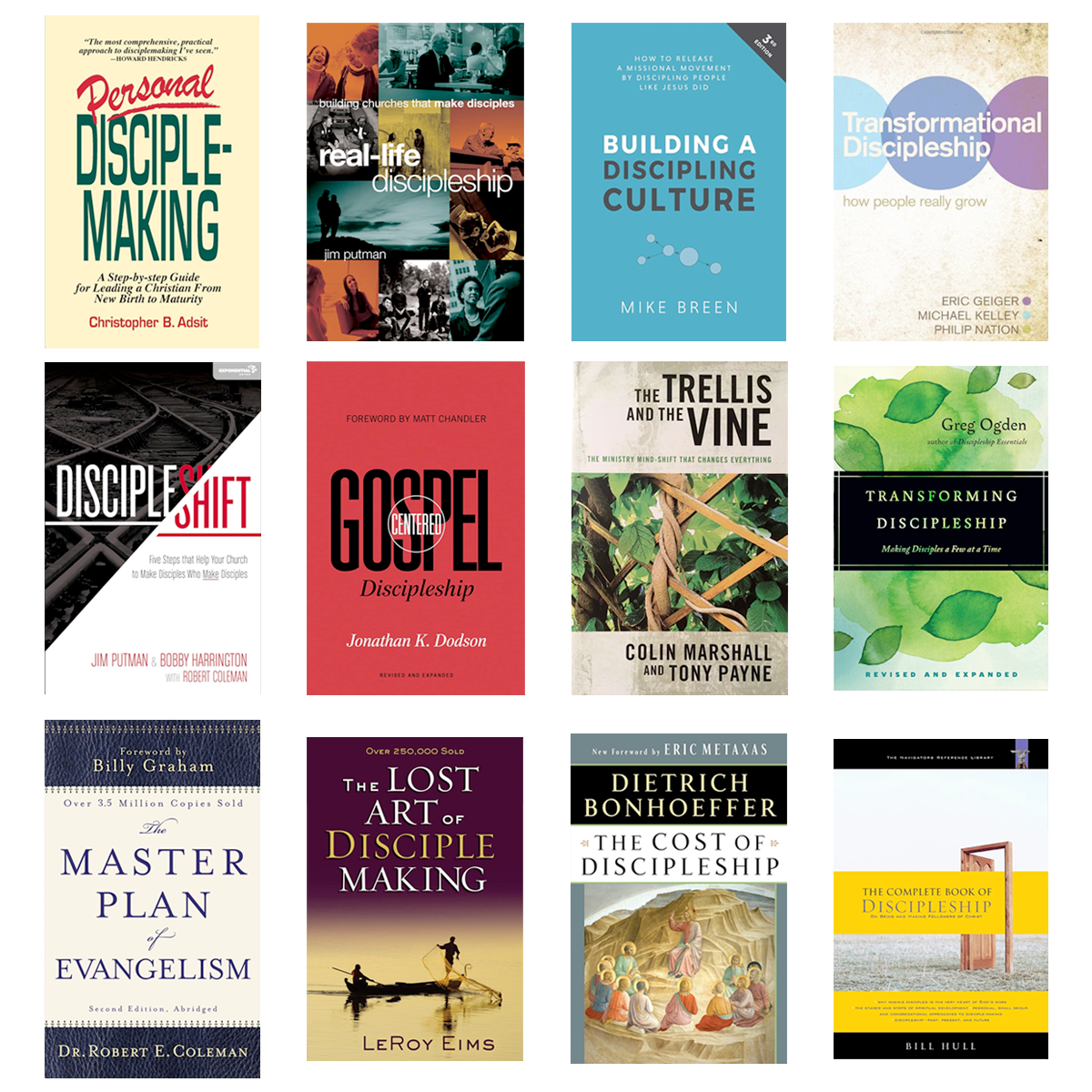When you stop and think about yourself and all of the Christians around you, how many people are true disciples of Christ in the way that God intended? I have a sneaking suspicion that the number is not what it should be. This is one of the reasons Paul challenges Timothy, in this last letter to his spiritual son, to not only make more disciples but to teach other people how to make disciples as well.

Let’s take a look at 2 Timothy 2:1‒2:
You then, my child, be strengthened by the grace that is in Christ Jesus, 2 and what you have heard from me in the presence of many witnesses entrust to faithful men who will be able to teach others also.
This is one of the texts that inspired Billy Graham to spend his life sharing the gospel and making disciples. He said, “One of the first verses of Scripture that Dawson Trotman, the founder of Navigators, told me to memorize was 2 Timothy 2:2. This is like a mathematical formula for spreading the gospel and enlarging the church.”[i] In just these few opening verses Paul has given Timothy a process for making disciples (verses 1 and 2) and a picture of what discipleship should look like.
Paul Outlines a 4-part strategy for Making Disciples:
- Abide in the Power of Christ
- Implement the Principles of Christ
- Invest in the People of Christ
- Repeating the Process of Christ
#1 - Abide in the Power of Christ
In order for us to be empowered to make disciples, we must first abide in the power of Christ. Paul writes, “You then, my child, be strengthened by the grace that is in Christ Jesus.” We cannot do anything in the Christian life apart from God’s grace that is found only in Christ Jesus. The word strengthened in the Greek New Testament means “empowered by” or “to be made strong” in order to accomplish a task. The use of the present tense for this word implies that being strengthened is something that must occur every single day. The term is also in the passive voice, which means that the subject is not performing the action but receiving the action.
Paul is essentially telling Timothy, “The way you will be strengthened for ministry and discipleship is by relying on God’s grace.” The good thing about God is that His grace never ends. He gives grace upon grace; He gives energy and power. We choose to rely on God’s grace by meditating on God’s Word and His character, by thinking about God’s grace, by asking God to give us grace, and by waiting patiently to receive His grace. Remember that Paul tells Timothy in chapter 1, verses 6–7, “For this reason I remind you to fan into flame the gift of God, which is in you through the laying on of my hands, for God gave us a spirit not of fear but of power and love and self-control.” In verses 13–14, he says, “Follow the pattern of sound words that you have heard from me, in the faith and love that are in Christ Jesus. By the Holy Spirit who dwells within us, guard the good deposit entrusted to you.” This is a reminder that the Christian life is an upside-down kingdom. It’s radically different from the kingdom of this world.
You don’t gain strength by acting in your own power; you gain strength by waiting on the Lord. Let’s look at a related biblical principle from the words of Jesus. In John 15:4–5, Jesus says, “Abide in me, and I in you. As the branch cannot bear fruit by itself, unless it abides in the vine, neither can you unless you abide in me. I am the vine; you are the branches. Whoever abides in me and I in him, he it is that bears much fruit, for apart from me you can do nothing.” Did you catch that? Apart from Jesus, we can do nothing. As Christ works in us, He also works through us.
2 Corinthians 12:7–10 is one of my favorite passages. In these verses we see Paul describing a thorn in the flesh, or messenger from Satan, sent by God to keep Paul from becoming conceited regarding the greatness of the revelations God had made to him. Three times Paul pleaded with the Lord to remove this torment. But God refused, reminding Paul, “My grace is sufficient for you, for my power is made perfect in your weakness.” Paul responds, “Therefore I will boast all the more gladly in my weakness so that Christ’s power may rest on me.” Paul tells us that the power of Christ rests on him when he boasts in his own weaknesses, insults, hardships, and persecutions. He knows that it is only when he is weak that he can be strong in Christ. To be strengthened by Christ is to be weak, humble, and open to His leading.
The one issue in your life that can seriously hinder the work of Christ is your pride. Humility, on the other hand, says, “I can’t do this in my own strength. I need Christ.” That’s why James 4 tells us that God opposes the proud but gives grace to the humble. If you are not reading the Word of God, I can guarantee you that you are not experiencing the fullness of the grace of God that should be given to you through the Word.
One of the main facets of discipleship is having a regular quiet time with the Lord. If you’re not drinking deeply from the well of His Word, how else can God deliver his grace and strength to you?
The second step in the Discipleship Process is to...
#2 - Implement the Principles of Christ
We must not only abide in the power of Christ, but we must also accept the principles of Christ. Paul tells Timothy to pass on “what you have heard from me in the presence of many witnesses.” The word witness here actually means, “martyr.” It’s the word for someone willing to die for his or her faith. Paul is saying, “You can test what I’m saying by the witnesses. These men don’t just speak the Word or listen to the Word; these men are going to die for the Word of God. They are not just church attendees; these men are literally willing to die for their faith in the Lord Jesus Christ.”
It’s one thing to stroll into church on Sunday morning and hear an uplifting word from God through the pastor. It’s another thing to live faithfully from Monday through Saturday. Are you putting the words you hear on Sunday into your life? Paul wanted to be sure that Timothy didn’t just hear the Word, but applied it faithfully to his life. Deuteronomy 4:1 says, “Hear now, O Israel. The decrees and the laws I am about to teach you. Follow them so that you may live.” And in Deuteronomy 5:1, Moses summons all of Israel and says, “Hear, O Israel, the decrees and laws I declare in your hearing today. Learn them and be sure to follow them.” Scripture always makes a strong connection between hearing and doing or obeying. But there is a heresy being taught in churches today. It’s reflected in this attitude: “I can choose to get saved by Jesus today but put off obedience to Him until I die and go to heaven, right? Hey, I don’t really want to be like Jesus! I just want fire insurance, pastor. I just don’t want to go to hell.” I’m sorry but you cannot choose Jesus as Savior without acknowledging Him as Lord of your life.
A few years ago, I spoke to a youth group, and I told the students, “You don’t have to tell me what you believe; just let me watch what you do and I’ll tell you what you believe. Your life will prove (or disprove) the case for the faith you attest to. The way you live will show me if you are a believer or a disciple in Jesus Christ.” Many relinquish parts of their Life to Christ, but not everything. It reminds me of the life changing night in the life of theologian and historian F. B. Meyer. One evening he was invited to heard C. T. Studd, the famous cricket player (equivalent to an NFL Athlete today) share his testimony of why he abandoned the sporting world to serve alongside Hudson Taylor in the China Inland Mission. Studd spoke a phrase in his message that pierced Meyers’ heart: “If Jesus Christ be God and died for me, then no sacrifice can be too great for me to make for Him.”
After the service, Meyer approached Studd and said, “It’s obvious that you have something I lack, something that I need. What is it?” Studd responded, “Have you Surrendered Everything to Jesus Christ?” Without thinking, Meyer replied, “Yes I have.” But he knew deep inside that he hadn’t. The interaction with Studd caused great anguish in his heart that evening. During his prayer time that night, he logged in his journal the interaction with God. Meyer felt as if the Lord speaking directly to him, “Meyer, I want all the keys to your Heart.” All the Keys? “Yes, Meyer, I want all the Keys.” That night, he took a ring of keys and offered them to the Lord, symbolizing his commitment to God. But he couldn’t fool God. There was still one key that was missing. It was as if the Lord rebuked him, “There is one key missing, and If I am not Lord of all, I am not Lord at All.” As the Lord turned from him, he yelled, “Lord don’t Leave! Why are you Leaving?” “Meyer, If I am not Lord of All, I am not Lord at All.” But Lord, its just a small key, a very insignificant place in my Heart! For the third time he heard, “If I am not Lord of All, I am not Lord at All.”
Meyer’s life would never be the same from the experience that night. Before he stood up, he wholly surrendered his life to the Lord Jesus—his career, his desires, his future, his thoughts, his dreams, his plans, his heart, and his mind. Have you Done that? Have you given him all the Keys to your Life? What could God do with your life if you surrendered it to him?
#3 - Invest in the People of Christ
“Entrust to faithful men…” A disciple is someone who invests in the people of Christ. Paul writes to Timothy, “And what you have heard from me in the presence of many witnesses entrust to faithful men who will be able to teach others also.” In this verse, Paul gives Timothy a command. It’s not an option; it’s not a choice. Entrust. Disciple. Timothy had been given a gift and Paul wanted to be sure he realized that the only way to safeguard and protect the gospel was by giving it away. If God has worked in your life, you need to give the investment away.
The goal of Christianity is not to show up at church every Sunday morning and simply be fed by the pastor; the goal of Christianity is to be fed in a way that allows and encourages you to give it away. Are you giving it away? Think of the Christian life as being a metal chain made of individual links. Every Christian is either connecting links or breaking links in the chain. You are either making connections, discipling people, and passing the baton to others in the faith or you’re breaking links. And that destroys the chain.
Who are we supposed to invest in? Paul says, “faithful men.” Unfortunately this doesn’t apply to everyone because not every wants to be discipled. In many churches, probably less than half of the attendees really want to be discipled. They are happy simply showing up at church on Sunday morning and staying in a comfortable spiritual place. In the ten years that I’ve discipled men in my ministry and my life, I’ve seen about 60 percent of them continue the spiritual journey for the long haul. I think that Paul is emphasizing the need for Timothy to find men who have a heart for God and a passion to not only make disciples, but also to be discipled. Sometimes we think Jesus had only twelve followers to choose from, but the truth is that He had to turn away more men that he chose. Jesus had thousands of men to choose from. Of the thousands who wanted to follow Him, He had to choose twelve who would be devoted to the cause. He had to exclude many men, and I’m sure a lot of them were faithful.
Jesus did not pick His disciples because they knew everything or because they were wealthy, brilliant, well-schooled, or talented theologically. Far from it! I believe that the one characteristic Jesus looked for in His disciples was that these men were teachable. I can work with somebody if they only have one talent, but I cannot work with them if they don’t have the characteristic of being teachable. In fact, you can even have little talent but still be teachable, and I can work with you. We must to get to the place where we desire to grow and learn.
Paul writes in 1 Corinthians 3:1–2: “Brothers, I could not address you as spiritual people, but as people of the flesh, as infants in Christ. I fed you with milk, not solid food, for you were not ready for it. And even now you are not yet ready, for you are still of the flesh.” Let’s grow up and mature from being infants to those who are ready for solid spiritual food. John Wesley, the great evangelist, said, “Give me a hundred men who fear nothing but God, hate nothing but sin and are determined to know nothing among men but Jesus Christ and him crucified, and I will set the world on fire with them.”[i]
Do you realize that if the apostles had only evangelized and hadn’t discipled anyone, none of us would be here today? Think about it. The call to faith is a call to teach people to pass on the gospel and the legacy of Christ. What if twelve of us had been chosen to be the twelve apostles? Would you and I be able to pass the message on for thousands of years? The weight of that responsibility rested upon those men. Paul discipled elders and deacons and prophets and leaders of the church. Eventually, he discipled Timothy. He tells Timothy, “You’ve been invested in; now go and make an investment in another person. Not in a 401(k), not in any retirement plan; invest in people.
That’s the only way your legacy is going to live on: by investing in people.” I would rather invest in a thousand people who become faithful followers and disciples of the Lord Jesus Christ than have a church of five thousand people who are a mile wide and an inch deep. I believe we can change our cities; I believe we can change the world. I love preaching, but this kind of change is not going to happen by preaching alone. We must invest in people.
#4 - Repeating The Process of Christ
The final step in the long process of disciple-making is for those whom have been discipled to go out and replicate themselves. Jesus Christ was adamant about making disciples. Failing to make disciples was not an option for Him since one of the primary reasons Christ was made incarnate was for establishing the kingdom. It is with the same heart as the Lord that Paul tells Timothy his strategy for building up the kingdom. In these two short verses Paul provides a genealogy of four generations of disciples. Paul taught Timothy—these are the first and second generations. Timothy is instructed to teach faithful men—this is the progression from the second to the third generation. Finally, those faithful men are instructed to teach others—the third generation gives birth to a fourth. We find four generations of disciples mentioned in this one verse.
What a challenge to us today!? How many people have you personally discipled and invested in, and how many of those individuals are now repeating the process? You see, when the local church becomes an end in itself, it ends. When Sunday School, as great as it is, becomes an end in itself, it ends. When small groups ministry becomes an end in itself, it ends. When the worship service becomes an end in itself, it ends.
What we need is for discipleship to become the goal, and then the process never ends. The process is fluid, living, and self-sustaining. Every Christian could be compared to one of two bodies of water: the Jordan River or the Dead Sea. The Jordan River is an active body of water. It flows from north to south. The Dead Sea, on the other hand, has an inlet but no outlet. Water comes in from the north but does not flow out. This causes the water to become stagnant and useless for drinking or bathing. I believe that each Christian can be compared to one of these bodies of water. You’re flowing and moving, usefully impacting lives for God, or you’re stagnant and lifeless, useful for little. We should be like Jesus, who in John 17 states that His work was “finished” once He created a band of disciples who would make disciples.
Jesus knew that the task God sent Him to accomplish was complete. You might assume that the task given to Jesus was to go to the cross and die for the sins of mankind. However, His task was to establish the kingdom while His destiny was to be crucified on behalf of all who believe. Leroy Eims writes, “When you read this prayer in chapter 17, you’ll notice that He did not mention miracles or multitudes one time; but he mentions forty different times the men whom God gave Him out of the world.” These men that He mentions are the disciples He invested in during His time on earth.. In verse 6, He says, “I have manifested your name to the people whom you gave me out of the world. Yours they were, and you gave them to me, and they have kept their word” (emphasis added).
Jesus Christ was interested in making disciples. That’s why He commanded His followers to “go and make disciples.” You may be tempted to say, “Well, I’m not a pastor. I’m not a teacher.” You don’t have to be a pastor or a teacher to disciple people. You don’t have to be a pastor or a teacher to join a discipleship group. The great thing about discipleship is that it’s not just you teaching others; it’s other people teaching you. It’s accountability. It’s encouragement. It’s fellowship between one believer and another.
After my first discipleship meeting over lunch, I’ll never forget what one of the guys told me. He looked at me and said, “Robby, I never knew that I could be discipled. I grew up in church all my life, and I’ve never known that it was even an option for me to be discipled. My view of Christianity was that I should come in on Sunday, hear a word from the Lord, and then try all week to pull myself up by my own bootstraps, and then come back the next Sunday and go out and do it again.” He also told me, “I didn’t realize that somebody could come alongside of me and teach me how to pray, teach me how to memorize scripture, teach me how to love my wife, teach me how to serve my church, and teach me how to serve the Lord and love it. I didn’t know that was even possible.” I have a feeling that many of you may not be aware that discipleship is an option either.
Discipleship is about getting together with two or three men or two or three women and saying, “Hey, let’s study the Bible together. Let’s learn together. Let’s grow together. Let’s see God work in our lives.” My goal for the people in my own church is for every person—whether he or she is a leader, a staff member, a Sunday School teacher, a nursery worker, a church member, a visitor, a member of the choir, a deacon, or anything else—to disciple another person or be discipled by someone at all times.
I’d like to see the youth discipling the younger children, the college students discipling the youth, the young adults discipling the college kids, the middle-aged adults discipling the young adults, and the senior adults discipling the middle-aged adults. This is how the process of discipleship should work. Can you imagine how different the church would look if we did this? People would say, “Man, there’s something different about those Christians. They really care about other people. They invest in the lives of people.” We should all have a heart for discipleship because we are all called to make disciples like Christ.
Don’t keep the knowledge of God, the gospel, and the Word to yourself; instill it in someone else!


